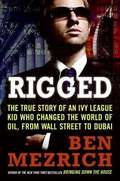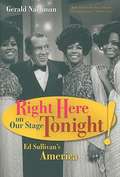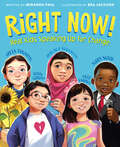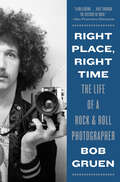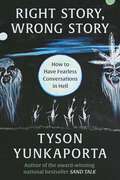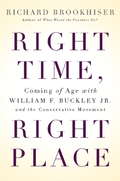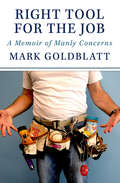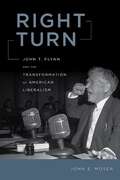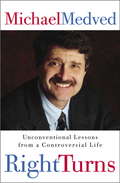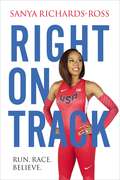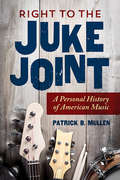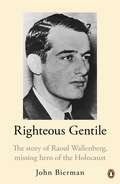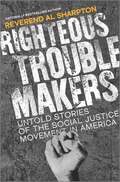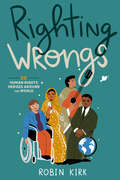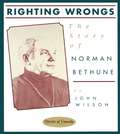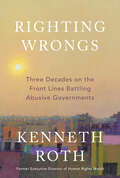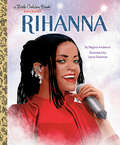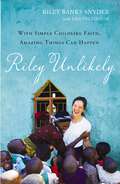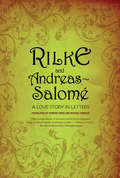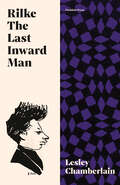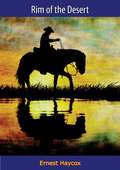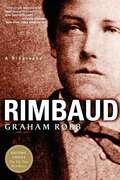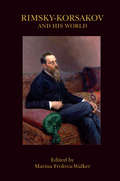- Table View
- List View
Rigged: The True Story of an Ivy League Kid Who Changed the World of Oil, from Wall Street to Dubai
by Ben MezrichFrom the author who brought you the massive New York Times bestseller Bringing Down the House, this is the startling rags-to-riches story of an Italian-American kid from the streets of Brooklyn who claws his way into the wild, frenetic world of the oil exchange. After conquering the hallowed halls of Harvard Business School, he enters the testosterone-laced warrens of the Merc Exchange, the asylumlike oil exchange located in lower Manhattan. A place where billions of dollars trade hands every week, the Merc is like a casino on crack, where former garbagemen become millionaires overnight and where fistfights break out on the trading floor. This ordinary kid has traded Brooklyn for the gold-lined hotel palaces of Dubai. He keeps company on the decks of private yachts in Monte Carlo-teeming with half-naked girls flown in by Saudi sheiks-and makes deals in the dangerous back alleys of Beijing. But the Merc is just a starting place. Taken under the wing of another young gun and partnering with a mysterious young Muslim, the kid embarks on a dangerous adventure to revolutionize the oil trading industry-and, along with it, the world. Rigged is the explicit, exclusive, true story behind the headlines that dominate the world stage.
Right Here on Our Stage Tonight!: Ed Sullivan's America
by Gerald NachmanThis book explores the transcendent Sullivan experience through the eyes of some 75 performers--famous, infamous, and long forgotten--who appeared on the show.
Right Now!: Real Kids Speaking Up for Change
by Miranda PaulA joyful, inspiring picture book that introduces readers to eleven young people from around the world who didn&’t wait until they were grown to speak up about things that matter to them and change the world for the better, from an award-winning author and New York Times best-selling illustrator.From climate activist Greta Thunberg to anti-bullying advocate Jaylen Arnold to peace activist Bana Alabed and more, these short profiles of young people and their causes will inspire readers to think about what matters most to them. An author's note, Actions to Make a Difference, and additional resources are also included, providing a roadmap for any kid who wants to make change and help others too.
Right Place, Right Time: The Life of a Rock & Roll Photographer
by Bob Gruen“Gruen chronicles his adventures as one of the preeminent photographers of rock and roll in his spectacular memoir . . . a roller-coaster narrative” (Publishers Weekly, starred review). Bob Gruen is one of the most well-known and respected photographers in rock and roll. From John Lennon to Johnny Rotten; Muddy Waters to the Rolling Stones; Elvis to Madonna; Bob Dylan to Bob Marley; Tina Turner to Debbie Harry, he has documented the music scene for more than fifty years in photographs that have captured the world’s attention. In Right Place, Right Time, Gruen recounts his personal journey from discovering a love of photography in his mother’s darkroom when he was five, through his time in Greenwich Village for 1960s rock and 1970s punk, to being named the world’s premiere rock photographer by the New York Times. With fast-paced stories and iconic images, Gruen gives the reader both a front row seat and a backstage pass to the evolution of American music culture over the last five decades. In the words of Alice Cooper, “Bob had the ultimate backstage pass. Can you imagine the stories he’s got?”
Right Story, Wrong Story: How to Have Fearless Conversations in Hell
by Tyson YunkaportaContinuing the work of the award-winning Sand Talk, Tyson Yunkaporta casts an Indigenous lens on contemporary society, challenging us to face conflict and embrace conversation to find our way onto the right track. With Right Story, Wrong Story, Apalech Clan member Tyson Yunkaporta, from far north Queensland, tackles the divisions that prevent us from talking to one another. Yunkaporta invites us to confront life’s biggest questions and arms us with the tools we need to really listen, and to open our minds to change based upon our connections with others. He makes this point through discussions with a diverse range of people across social and political divides including:liberal economistsmemorization expertsFrisian ecologistsand Elders who are wood carvers, mathematicians, and storytellers.Building upon the Indigenous tradition of “yarning” to weave our individual narratives into the great narrative that includes us all across any and all differences, Yunkaporta argues that story is at the heart of everything. But what is right or wrong story?
Right Time, Right Place: Coming of Age with William F. Buckley Jr. and the Conservative Movement
by Richard BrookhiserRichard Brookhiser wrote his first cover story for National Review at age fourteen, and became the magazine’s youngest senior editor at twenty-three. William F. Buckley Jr. was Brookhiser’s mentor, hero, and admirer; within a year of Brookhiser’s arrival at the magazine, Buckley tapped him as his successor as editor-in-chief. But without warning, the relation ship soured--one day, Brookhiser returned to his desk to find a letter from Buckley unceremoniously informing him "you will no longer be my successor. ” Brookhiser remained friends and colleagues with Buckley despite the breach, and in Right Time, Right Place he tells the story of that friendship with affection and clarity. At the same time, he provides a delightful account of the intellectual and political ferment of the conservative resurgence that Buckley nurtured and led. Witty and poignant, Right Time, Right Place tells the story of a young man and a political movement coming of age--and of the man who inspired them both.
Right Tool for the Job: A Memoir of Manly Concerns
by Mark GoldblattManhood today is under siege--regarded as an object of menace on college quads, associated with various forms of real and imagined oppression, ridiculed in humanities departments, parodied by sitcoms and commercials, and shriveled to a raisin-sized remnant by psychosexual theorizing. But while manhood may be under attack in a sociopolitical context, it remains very much a living idea which every penis-endowed person must wrestle with over the course of his lifetime. The Right Tool for the Job is a comic account of one man's struggle to honor his testosterone heritage--with varying results.
Right Turn: John T. Flynn and the Transformation of American Liberalism
by John E. MoserJohn T. Flynn, a prolific writer, columnist for the New Republic, Harper's Magazine, and Collier's Weekly, radio commentator, and political activist, was described by the New York Times in 1964 as “a man of wide-ranging contradictions.” In this new biography of Flynn, John E. Moser fleshes out his many contradictions and profound influence on U.S. history and political discourse.In the 1930s, Flynn advocated extensive regulation of the economy, the breakup of holding companies, and heavy taxes on the wealthy. A mere fifteen years later he was denouncing the New Deal as “creeping socialism,” calling for an abolition of the income tax, and hailing Senator Joseph McCarthy and his fellow anticommunists as saviors of the American Republic. Yet throughout his career he insisted that he had remained true to the principles of liberalism as he understood them.It was America's political culture that changed, he argued, and not his values and views. Drawing on Flynn’s life and his prolific writings, Moser illuminates how liberalism in America changed during the mid-twentieth century and considers whether Flynn’s ideological odyssey was the product of opportunism, or the result of a set of deep-seated principles that he championed consistently over the years. In addition, Right Turn examines Flynn’s role in laying the foundations for the “culture war” that would be played out in American society for the rest of the century, helping to define modern American conservatism.
Right Turns: From Liberal Activist to Conservative Champion in 35 Unconventional Lessons
by Michael MedvedNationally syndicated talk-radio host and noted film critic Michael Medved has taken an extraordinary journey from liberal activist to outspoken conservative. Along the way he has earned millions of admirers--and more than his share of enemies--with his disarming wit and slashing arguments on issues of pop culture and politics. In the candid, illuminating Right Turns, Medved chronicles the lessons and adventures that changed him from a Vietnam protest leader to an optimistic promoter of American patriotism, from secularism to religion, from adventurous single guy to doting husband and father. He skewers leftist orthodoxy, revealing why the Right is right and why his former colleagues on the Left remain hopelessly wrong on every cultural, political, and social issue.
Right on Track: Run, Race, Believe
by Sanya Richards-RossTrack and field champion Sanya Richards-Ross knows what it takes to achieve the impossible. With multiple Olympic gold medals and World Championship accolades, Sanya has long been a role model for young runners around the world. In her first-ever book for young adults, Sanya shares her advice and wisdom when it comes to chasing your dreams. Filled with hands-on success strategies and personal anecdotes, Right on Track: Run, Race, Believe will help readers face wins and losses with grace, strength, and faith. With chapters discussing setting goals, staying focused on the finish line, and being true to yourself, this book is perfect for teens and graduates. Empowering and inspiring, Right on Track encourages teens to dream big and take the ups and downs of life in stride.
Right to the Juke Joint: A Personal History of American Music (Music in American Life)
by Patrick B MullenThe cowboy songs and dusty Texas car rides of his youth set Patrick B. Mullen on a lifelong journey into the sprawling Arcadia of American music. That music fused so-called civilized elements with native forms to produce everything from Zydeco to Conjunto to jazz to Woody Guthrie. <P><P>The civilized/native idea, meanwhile, helped develop Mullen's critical perspective, guide his love of music, and steer his life's work. Part scholar's musings and part fan's memoir, Right to the Juke Joint follows Mullen from his early embrace of country and folk to the full flowering of an idiosyncratic, omnivorous interest in music. Personal memory merges with a lifetime of fieldwork in folklore and anthropology to provide readers with a deeply informed analysis of American roots music. <P>Mullen opens up on the world of ideas and his own tireless fandom to explore how his cultural identity--and ours--relates to concepts like authenticity and "folkness." The result is a charming musical map drawn by a gifted storyteller whose boots have traveled a thousand tuneful roads.
Righteous Gentile: The Story of Raoul Wallenberg, Missing Hero of the Holocaust
by John BiermanWallenberg's heroism, and the acts that stirred him to action, are clearly dramatic, yet the man remains distant and slightly detached in this account by Bierman - like the Pimpernel, Raoul is an elusive figure, part legend and part controversy.
Righteous Gentile: The Story of Raoul Wallenberg, Missing Hero of the Holocaust
by John BiermanSwallowed up by the Soviet prison system, the fate of Raoul Wallenberg, saviour of tens of thousands of Hungarian Jews during the Nazi holocaust, remains a mystery.Recently KGB files have been opened and many Communist crimes have been fully exposed. Yet there is still no evidence, apart from a handwritten note of doubtful authenticity, to support the Kremlin's claim that in 1947 Wallenberg, then thirty-five years old, died of a heart attack in prison. On the other hand there is abundant evidence - none of it conclusive, but much of it highly persuasive - that Wallenberg remained alive in captivity long after 1947, broken in body and spirit, somewhere in the vastness of the former Soviet Union.Righteous Gentile is the first book to tell the full story of Raoul Wallenberg's shining wartime exploits and shameful post-war incarceration.
Righteous Troublemakers: Untold Stories of the Social Justice Movement in America
by Al SharptonBestselling author Reverend Al Sharpton brings to light the stories of the unsung heroes of the Civil Rights movement, drawing on his unique perspective in the history of the fight for social justice in America &“This is the time. We won&’t stop until we change the whole system of justice.&”—Rev. Al SharptonWhile the world may know the major names of the Civil Rights movement, there are countless lesser-known heroes fighting the good fight to advance equal justice for all, heeding the call when no one else was listening, often risking their lives and livelihoods in the process.Righteous Troublemakers shines a light on everyday people called to do extraordinary things—like Pauli Murray, whose early work informed Thurgood Marshall&’s legal argument for Brown v. Board of Education, Claudette Colvin, who refused to give up her seat on a segregated bus months before Rosa Parks did the same, and Gwen Carr, whose private pain in losing her son Eric Garner stoked her public activism against police brutality. Sharpton also illuminates the lives of more widely known individuals, revealing overlooked details, historical connections, and a perspective informed by years of working on the front line of the social justice movement, to provide a behind-the-scenes look at the wheels of justice and the individuals who have helped advance its cause.
Righting Wrongs: 20 Human Rights Heroes Around the World
by Robin KirkMany young people aren't aware that determined individuals created the rights we now take for granted. The idea of human rights is relatively recent, coming out of a post–World War II effort to draw nations together and prevent or lessen suffering. Righting Wrongs introduces children to the true stories of 20 real people who invented and fought for these ideas. Without them, many of the rights we take for granted would not exist. These heroes have promoted women's, disabled, and civil rights; action on climate change; and the rights of refugees. These advocates are American, Sierra Leonean, Norwegian, and Argentinian. Eleven are women. Two identified as queer. Twelve are people of color. One campaigned for rights as a disabled person. Two identify as Indigenous. Two are Muslim and two are Hindu, and others range from atheist to devout Christian. There are two journalists, one general, three lawyers, one Episcopal priest, one torture victim, and one Holocaust survivor.Their stories of hope and hard work show how people working together can change the world for the better.
Righting Wrongs: The Story of Norman Bethune
by John WilsonShort-listed for the 2002 Canadian Children’s Book Centre Norma Fleck Award <P><P>Norman Bethune was a doctor who devoted his life to helping others and whose story is a remarkable one, cut short by his early death in China in 1938. <P><P>This biography in our Stories of Canada series traces his life from his childhood spent moving around Ontario as a preacher’s son to his experiences in the First World War and his crusades to find a cure for tuberculosis and to promote health care in Canada. <P><P>But Bethune is most famous for the time he spent fighting Fascism through his profession of healing in Spain and China during the late 1930s. His story inspires us to believe that we can change the world through our actions.
Righting Wrongs: Three Decades on the Front Lines Battling Abusive Governments
by Kenneth RothFrom the long-time head of Human Rights Watch, the fascinating and inspiring story of taking on the biggest villains and toughest autocrats around the worldIn three decades under the leadership of Kenneth Roth, Human Rights Watch grew to a staff of more than 500, conducting investigations in 100 countries to uncover abuses—and pressuring offending governments to stop them. Roth has grappled with the worst of humanity, taken on the biggest villains of our time, and persuaded leaders from around the globe to stand up to their repressive counterparts. The son of a Jew who fled Nazi Germany just before the war began, Roth grew up knowing full well how inhumane governments could be. He has traveled the world to meet cruelty and injustice on its home turf: he arrived in Rwanda shortly after the Genocide; scrutinized the impact of Saddam&’s invasion of Kuwait; investigated and condemned Israel&’s mistreatment of Palestinians. He directed efforts to curtail the Chinese government&’s persecution of Uyghur Muslims, to bring Myanmar&’s officials to justice after the ethnic cleansing of Rohingya Muslims, to halt Russian war crimes in Ukraine, even to reign in the U.S. government. Roth&’s many innovations and strategies included the deployment of a concept as old as mankind—the powerful tool of &“shaming&”—and here he illustrates its surprising effectiveness against evildoers. This is a story of wins, losses, and ongoing battles in the ceaseless fight to uphold our most basic values.
Rihanna: A Little Golden Book Biography (Little Golden Book)
by Regina AndreoniGet to know Rihanna and find out how the talented performer from Barbados became a worldwide sensation with this beautifully illustrated and collectible Little Golden Book!Read all about Rihanna, the Barbadian singer, songwriter, actress, and businesswoman. Known for her catchy hit songs "Umbrella" and "Diamonds," as well as her unique fashion sense, Rihanna's journey is truly captivating. Rihanna: A Little Golden Book Biography will be enjoyed by RiRi's fans of all ages!Look for more Little Golden Book biographies: • Lady Gaga • Beyoncé • Barbra Streisand • Taylor Swift • Selena
Riley Unlikely: With Simple Childlike Faith, Amazing Things Can Happen
by Riley Banks-SnyderRiley Unlikely is the inspiring story of Riley Banks, who first traveled to Kenya at age 13, and has been back every year since bringing backpacks of school supplies and hygiene kits for young girls, developing relationships and friendships, and is currently, as a young millennial, raising money to build a complete learning complex in Kibwezi, Kenya for those who have nothing.At age sixteen Riley learned that, because of a rare medical condition, she would never be able to have her own children. Devastating news to most young women, especially those who love children and have always dreamed of having their own family. But Riley’s response was: Kenya has given me a thousand children.Riley’s stories of her trips to Kenya, her struggles to figure out how to best serve and care for these people she has fallen in love with, and her own unexpected health issues are funny, compelling and gripping. Readers will find that God writes surprising stories in the lives of those who follow Him. Hard to put down, Riley Unlikely will inspire you to pursue your dreams and make a difference in your own world—and around the world.
Rilke and Andreas-Salomé: A Love Story in Letters
by Rainer Maria Rilke Edward Snow Michael Winkler Lou Andreas-Salomé"Immensely readable...a significant piece of scholarship."--Fred Volkmer, New York Sun He would become one of the most important poets of the twentieth century; she a muse of Europe's fin-de-siecle thinkers and artists. In this collection of letters, a finalist for the PEN USA translation award, the poet Rainer Maria Rilke and Lou Andreas-Salomé, a writer and intellectual fourteen years his senior, pen a relationship that spans thirty years and shifting boundaries: as lovers, as mentor and protégé, and as deep personal and literary allies.
Rilke: The Last Inward Man
by Lesley ChamberlainAn incisive and intimate account of the life and work of the great poet Rilke, exploring the rich interior world he created in his poetryWhen Rilke died in 1926, his reputation as a great poet seemed secure. But as the tide of the critical avant-garde turned, he was increasingly dismissed as apolitical, as too inward. In Rilke: The Last Inward Man, acclaimed critic Lesley Chamberlain uses this charge as the starting point from which to explore the expansiveness of the inner world Rilke created in his poetry. Weaving together searching insights on Rilke's life, work and reception, Chamberlain casts Rilke's inwardness as a profound response to a world that seemed ever more lacking in spirituality. In works of dazzling imagination and rich imagery, Rilke sought to restore spirit to Western materialism, encouraging not narrow introversion but a heightened awareness of how to live with the world as it is, of how to retain a sense of transcendence within a world of collapsed spiritual certainty.
Rim of the Desert
by Ernest HaycoxTHE LAW OF LEAD IN THE WESTThe Broken Bit boys shot Sheriff Ben Borders after the nesters and law-abiders had re-elected him. Old Ben lay dying on the courthouse steps with Jim Keene looking down at him.“You stayin’?” said Ben.“I’ll be staying,” said Jim.“Well, when you get to the other side of the hill—remember this, son—the only thing you’ll find there is just what you brought with you.”Jim Keene had ridden a thousand miles to get to Cloud Valley and away from trouble. He was a strong man and a fighting man, but he always took sides. He couldn’t help fighting for the underdog. And when he got to Cloud Valley he found that he couldn’t run away from himself.With the sheriff dead, there was no law. So Jim Keene dealt himself in on the fight—on the side of the weak—and shot his way to justice…
Rimbaud the Son
by Pierre Michon Jody Gladding Elizabeth DeshaysRimbaud the Son, widely celebrated upon its publication in France, investigates the life of a writer, the writing life, and the art of life-writing. Pierre Michon in his groundbreaking work examines the storied life of the French poet Arthur Rimbaud by means of a new literary genre: a meditation on the life of a legend as witnessed by his contemporaries, those who knew him before the legends took hold. Michon introduces us to Rimbaud the son, friend, schoolboy, renegade, drunk, sexual libertine, visionary, and ultimately poet. Michon focuses no less on the creative act: What presses a person to write? To pursue excellence? The author dramatizes the life of a genius whose sufferings are enormous while his ambitions are transcendent, whose life is lived with utter intensity and purpose but also disorder and dissolution#151;as if the very substance of life is its undoing. Rimbaud the Son is now masterfully translated into English, enabling a wide new audience to discover for themselves the author Publishers Weekly called #147;one of the best-kept secrets of modern French prose. "
Rimbaud: A Biography
by Graham Robb"Superb...the single best work to read about this haunting and haunted poet."―Richard Howard, New York Times Book Review Unknown beyond the avant-garde at the time of his death, Arthur Rimbaud (1854-1891) has been one of the most destructive and liberating influences on twentieth-century culture. During his lifetime he was a bourgeois-baiting visionary, and the list of his known crimes is longer than the list of his published poems. But his posthumous career is even more astonishing: saint to symbolists and surrealists; poster child for anarchy and drug use; gay pioneer; a major influence on artists from Picasso to Bob Dylan. 1
Rimsky-Korsakov and His World: Not Assigned (The\bard Music Festival Ser. #43)
by Marina Frolova-WalkerA rare look at the life and music of renowned Russian composer Nikolai Rimsky-KorsakovDuring his lifetime, Nikolai Rimsky-Korsakov (1844–1908) was a composer whose work had great influence not only in his native Russia but also internationally. While he remains well-known in Russia—where many of his fifteen operas and various orchestral pieces are still in the standard repertoire—very little of his work is performed in the West today beyond Scheherezade and arrangements of The Flight of the Bumblebee. In Western writings, he appears mainly in the context of the Mighty Handful, a group of five Russian composers to which he belonged at the outset of his career. Rimsky-Korsakov and His World finally gives the composer center stage and due attention.In this collection, Rimsky-Korsakov’s major operas, The Snow Maiden, Mozart and Salieri, and The Golden Cockerel, receive multifaceted exploration and are carefully contextualized within the wider Russian culture of the era. The discussion of these operas is accompanied and enriched by the composer’s letters to Nadezhda Zabela, the distinguished soprano for whom he wrote several leading roles. Other essays look at more general aspects of Rimsky-Korsakov’s work and examine his far-reaching legacy as a professor of composition and orchestration, including his impact on his most famous pupil Igor Stravinsky.The contributors are Lidia Ader, Leon Botstein, Emily Frey, Marina Frolova-Walker, Adalyat Issiyeva, Simon Morrison, Anna Nisnevich, Olga Panteleeva, and Yaroslav Timofeev.The Bard Music FestivalBard Music Festival 2018Rimsky-Korsakov and His WorldBard CollegeAugust 10–12 and August 17–19, 2018
